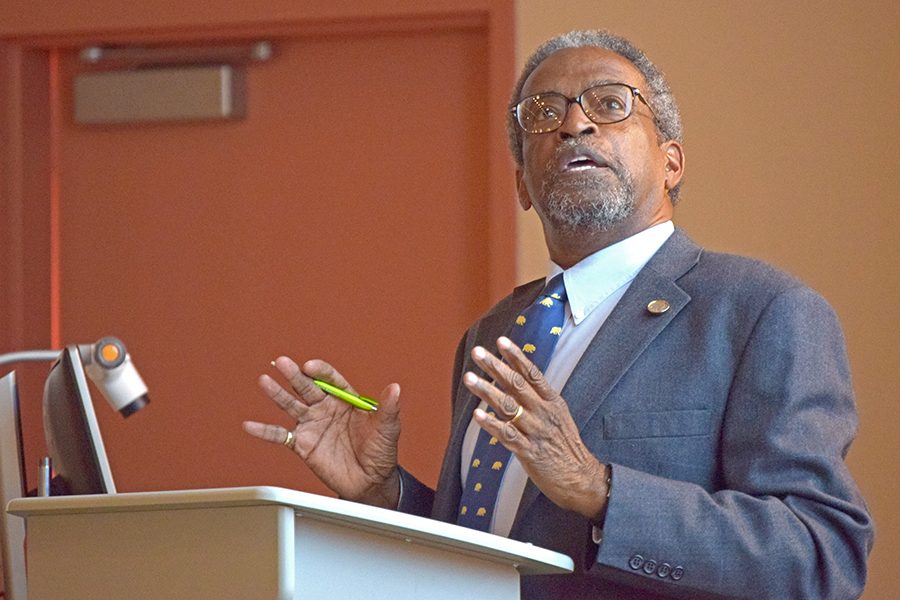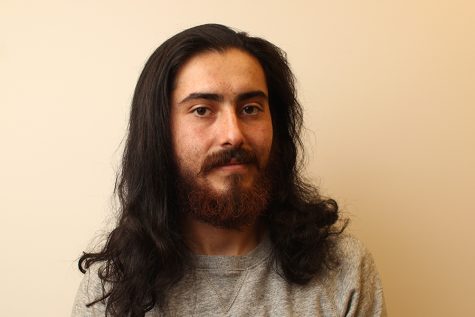Professor Analyzes Political movement
Black Panther talks raise more inquiries
Oct 6, 2016
To honor its 50th anniversary, a former Black Panther Party member returned to explain his dissertation research about the organization’s decline and local origins.
Former Virginia State University history professor Paul Alkebulan led his second discussion at Contra Costa College in a year with a group of about 100 students during, “The Black Panther Party and Its Legacy: A Seminar” on Saturday from 2 to 4 p.m. in GE-224.
Sociology department Chairperson Vern Cromartie said he invited Dr. Alkebulan as part of the W.E.B. DuBois Lecture Series to discuss his first-hand experience with the Black Panther Party. The discussion was planned to remain focused on the political context of the 1960s and 1970s and his dissertation research.
After the keynote speech, Alkebulan took the floor to respond to questions directly related to the Black Panthers’ movement because the DVD for the film “The Black Panthers: Vanguard of the Revolution,” (billed as part of the presentation) cracked in half in its case.
“The film is two hours long so it goes into a lot more detail about the party. The last movie I screened was shorter and focused on the Black Panthers at Merritt College,” Dr. Cromartie said. “But this film talks about the Black Panthers’ expansion nationwide. That is why its is so much more powerful.”
CCC nursing student Michelle Nance said while she did not know much about the party, the seminar helped her get a better understanding of the Black Panthers’ philosophy.
“We didn’t get to see the video so I feel like I didn’t get the full picture of what the Black Panthers were trying to teach,” Nance said. “I didn’t know anything about the Black Panthers or black power outside of the paragraph that we all read in our history textbooks.”
Alkebulan discussed his involvement with the party during his early 20s as a student activist in Oakland from 1969-72 and its internal power struggle. He examined arrests, killings and the FBI’s COINTELPRO program that contributed to shut down all of its international and domestic chapters by 1982.
He said urban areas in the North and West regions of the country gave rise to the Black Panthers due to similar conditions. Average citizens united against high poverty rates, voting disenfranchisement, police brutality and high incarceration rates of African-Americans and other minority groups.
Associated Student Union Vice President Alex Walker-Griffin said Alkebulan’s experience as a Black Panther and researcher is a perspective not widely available.
“A lot of people distanced themselves from the Black Panther Party for over 40 years,” Walker-Griffin said. “I always asked myself, well, what do their accomplishments have to do with me. But the presentation was relatable to modern struggles people face.”
Alkebulan said goals that the Black Panther Party accomplished were getting African-Americans into positions of political office, police departments and representation in all forms of the democratic process.
“In the 1970s, the black caucus began national organizing,” he said. “Blacks were getting elected on the local level across the nation, that was going to occur regardless of the Panther Party. And it occurred more often after the party went out of existence.”
He said the main issue that activists of today should work toward is the reconstruction of the family structure that was destroyed by drugs and a culture of narcissism.
“The traditional family structure made sure when a child leaves home they’re going to be prepared to learn something at school,” he said. “You have to be determined in that sense, but that is hard to do with a single parent in a household. A lot of parents don’t know how to help. You need supervision and examples to set you on the right path.”
But when people in the audience asked questions that drew parallels between the Black Panther Party to modern social movements, Alkebulan respectfully declined to answer.
Cultural lines in time
After the seminar, Cromartie said Alkebulan was told not to answer any questions that drew parallels between the Black Panther Party and the Black Lives Matter movement or recent political movements.
In response to questions asking to draw comparisons, Alkebulan said, “The Black Panther Party was a particular creature created under a certain set of circumstances. It was a vastly different animal than (Black Lives Matter).”
He said the Black Panther Party eventually became an organization that sought sovereignty of its own communities through social programs and communal policing.
Cromartie said the Black Lives Matter movement is important to its time period, but also said people in social movements should learn from mistakes made by the Black Panthers.
“I want students to hear voices of people like (Alkebulan). People who have made the shift from a social movement to academia,” Cromartie said. “You have one chance to hear about the Black Panther Party, you can hear about the Black Lives Matter on channel 7 or 2. You rarely hear about social movements of the past.”
While Nance and Walker-Griffin said they understand why he refused to comment on current political discourse, like the presidential election or national anthem protests, some audience members wished he would have.
UC Berkeley’s International Socialist Party member Francois Hughes heard about the event through Kyle “X”, a member of the Black Riders Liberation Party — an organization inspired by the Black Panther’s 10-point program.
Hughes said not answering questions that pertain to current politics does not make the Black Panthers’ message relevant for students living in a political climate that is similar to the conditions of the 1970s.
“Politics is relevant to me, but not everyone can see its importance,” he said. “There needed to be more explanation about how the Black Panther’s ideology is something worth thinking about now. It was especially difficult to relate to when no parallels were drawn to current political movements and protests.”
X, a former student at CCC, marched into the lecture hall wearing a black leather jacket, black jeans, black boots and a black beret minutes before the seminar was over.
After speaking with Alkebulan, X said he disagrees with the guest speaker’s statement that the Black Panthers are not still active.
“We are the new generation of the Black Panthers,” he said. “I don’t know how (Alkebulan) can say we don’t exist anymore. The BRPL was founded right after the Oscar Grant shooting in Oakland.”
He said there is not a full schedule of meetings, but they meet in public places once every few months to talk about possible social programs for the community, and protests.
“We inform people though different revolutionary music. A couple of members pitched in to pay for studio (time) to produce hip-hop,” he said. “And the new generation also provides the community with a newspaper.”
Kyle X said the BRPL uses the Black Panther’s 10-point program but added three points that address environmental racism, housing and medical restrictions in urban communities.
After the meeting, X and Hughes said they plan to attend the 50th anniversary Black Panther Celebration on Oct. 20-23 at the Oakland Museum of California.
He said he refused to give his full name because he said the FBI’s COINTELPRO program could still be watching.
Power to the people
During the question and answer period, Alkebulan said the party was initially a black power nationalist movement that started in 1966 when leaders Bobby Seale and Huey Newton followed police officers with guns and read people their Miranda rights.
“One thing the Black Panther Party was created for was to deal with police brutality,” he said.
Alkebulan said the Black Panther Party originally shunned the teachings of Dr. Martin Luther King Jr. and used the nationalistic ideologies influenced by Malcolm X.
“The Black Panther Party chose Malcolm X as its spiritual, moral and ideological godfather — no doubt,” he said.
In 1967, he said its members stood on the state Capitol steps with guns to oppose a bill that would restrict citizens from the right to carry loaded weapons in public.
He said this high profile protest prompted the FBI COINTELPRO program to investigate the Panthers using informants and hate letters to pit people within organizations against each other.
He said the Black Panthers were considered militant socialists by the mainstream media, but people in the organization and in local communities were uniting to govern their own lives.



